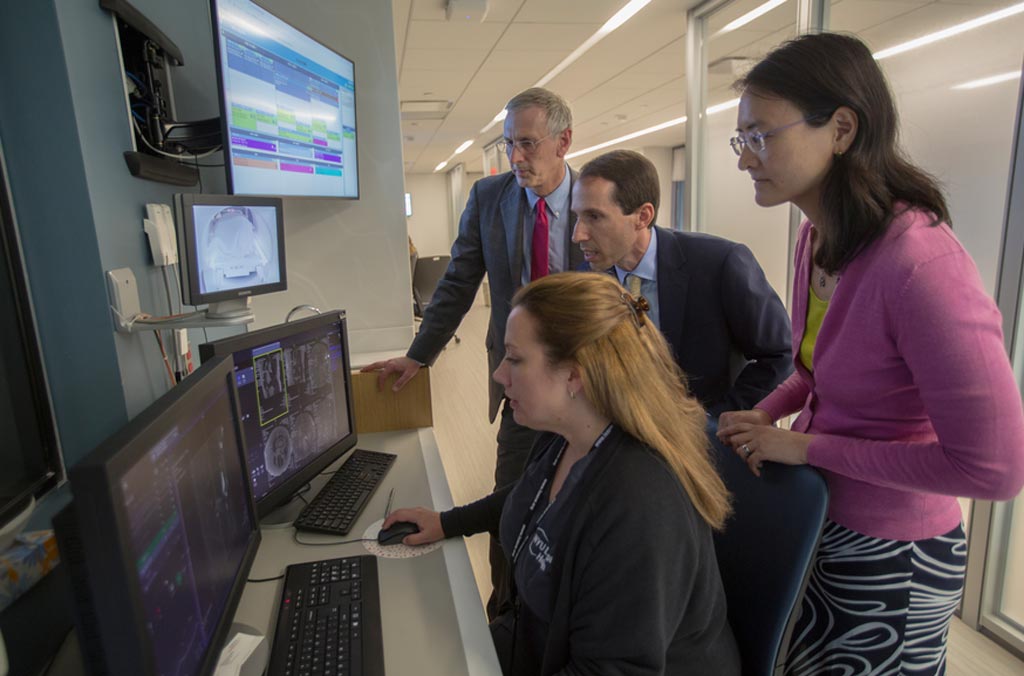Largest-Ever Open-Source Dataset Released to Speed Up MRIs Using AI
By MedImaging International staff writers
Posted on 18 Dec 2018
The NYU School of Medicine’s (New York, NY, USA) Department of Radiology is releasing the first large-scale MRI dataset of its kind as part of fastMRI, a collaborative effort with Facebook AI Research (New York, NY, USA) to speed up MRI scans with artificial intelligence (AI). Posted on 18 Dec 2018
The collaboration is aimed at sharing open source tools and spurring the development of AI systems to make MRI scans 10 times faster. The collaboration will promote research reproducibility, provide consistent evaluation methods, and empower the larger community of AI and medical imaging scientists.

Image: NYU School of Medicine Department of Radiology chair, Michael Recht, MD; Daniel Sodickson, MD, PhD, vice chair for research and director of the Center for Advanced Imaging Innovation and Research; and Yvonne Lui, MD, director of artificial intelligence, watch an MRI exam take place with at NYU Langone Health in New York in August 2018.
Using AI, researchers believe it will be possible to capture less data, and therefore image faster, while preserving or even enhancing the rich information contained in MR images. Leaders of the study say that, if successful, fastMRI could benefit a wide range of people who may have difficulty tolerating lengthy scans, including young children, elderly patients, and claustrophobic individual. It could also decrease the need for anesthesia or sedation. Additionally, the project could expand access to this key diagnostic tool, particularly in areas where there is a shortage of MRI scanners and patients face long wait-times for their scans.
The initial dataset release includes more than 1.5 million anonymous MR images of the knee, drawn from 10,000 scans, in addition to raw measurement data from nearly 1,600 scans. While other sets of radiological images have been released previously, this dataset represents the largest public release of raw MRI data to date. The first phase of the project will involve data from knee MRI scans, but future releases will include data from liver and brain scans. The joint team will also provide a suite of tools, including baseline metrics to compare results, and a leaderboard to keep track of progress as part of an organized challenge to be announced in the near future.
"fastMRI not only could have an important impact in the medical field, it's also an interesting research challenge that will help to advance the field of AI," said Larry Zitnick, Research Manager, Facebook AI Research. "To be medically useful, our AI-reconstructed images need to be more than just good-looking, they must also be accurate representations of the ground-truth, even though they're created from significantly less data. The dataset NYU Langone is releasing and the baseline models we've open-sourced will enable other researchers to join us in working on this challenging problem, and we believe this open approach will bring about positive results more quickly."
“This collaboration focuses on applying the strengths of machine learning to reconstruct high-value images in new ways. Rather than using existing images to train AI algorithms, we will radically change the way medical images are acquired in the first place,” said Daniel Sodickson, MD, PhD, professor of radiology and neuroscience and physiology and director of CAIR. “Our aim is not merely enhanced data mining with AI, but rather creating new capabilities for medical visualization, to benefit human health.”
Related Links:
NYU School of Medicine
Facebook AI Research














